Rob Molhoek: Southport MP reveals how he fought to recover from a stroke
Rob Molhoek is staging a remarkable recovery from a stroke which left him in a wheelchair. He reveals his future plans and what it means for his career. SEE THE VIDEO
QLD Votes
Don't miss out on the headlines from QLD Votes. Followed categories will be added to My News.
Southport MP Rob Molhoek is staging a remarkable recovery from a stroke which left him in a wheelchair and contemplating “what if I don’t come out of this?”.
But he reveals in an exclusive interview from Gold Coast University Hospital he will be out doorknocking again to contest the State election in October.
The 64-year-old MP has revealed how he went “to hell and back” in critical care. Mr Molhoek has gained movement in his left leg and arm, corrected his slurred speech. He will leave hospital soon, ending speculation about his political future.
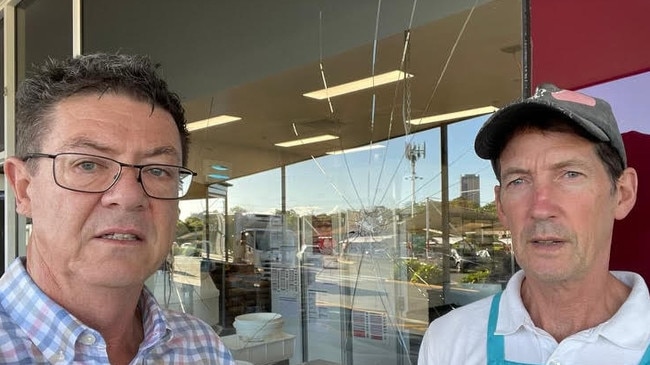
DRIVING TO EMERGENCY.
The scariest part is the lack of medical warning signs. Mr Molhoek is a non-smoker and keeps fit.
He had an earlier visit to hospital to start the year, after suffering from appendicitis. He took a week off before returning to Parliament and his “adopted Aunt” Liisa Stanley, at Christmas, recalls seeing him upbeat about the tough election year ahead.
At the hospital during the latest interview with the Bulletin, she chimes in telling him: “You had had a great break before (the stroke). You went to China, you had a wonderful time of it. You came back really positive.”
But there had been moments leading up to it of “feeling lousy”. He had been a “bit too busy”, renovating his house.
The day it happened, on February 23, he is up early, taking a shower, preparing for a TSS business breakfast with retired tennis star Ash Barty as the guest speaker.
“I thought my left hand was lagging. At first I put it down to I had been doing a bit in the garden, hanging up some party lights the night before out the back deck, maybe I’ve sprained something,” Mr Molhoek says.
He telephones to cancel the breakfast and thinks about getting a coffee.
“I was on my way to Zarraffa's in Olsen Avenue (at Molendinar) and I just thought I need to keep going. I drove around to the ED, they admitted me,” he says.
His first thoughts are he needs to be hydrated. Perhaps they will put him on a drip, and he can get back to the office after lunch.
“As the day went on I started to lose function in my left arm, and my left leg, and by four o’clock I couldn’t move them. And my speech was a bit slurred,” he says.
Only the day before, some fridge magnets had arrived from the Stroke Foundation. He recalls asking a staffer: “What are we going to do with these.”
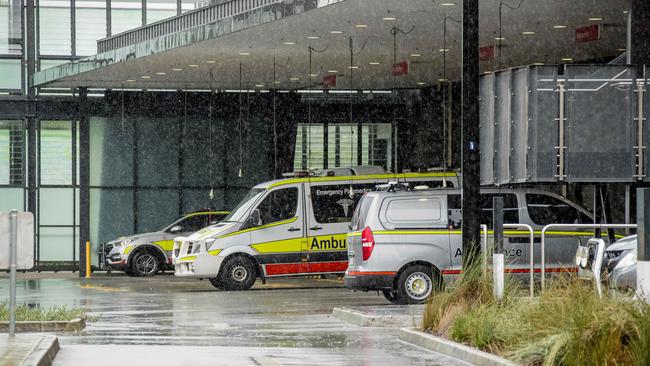
THE THIRD DAY IN CRITICAL CARE.
“That was awful (in critical care). I mean the staff were great. I just kind of went to hell and back in my thoughts,” he says.
“Like what if, what if. What if I don’t come out of this. Am I going to be in a wheelchair for the rest of my life. Am I going to need to find someone to pay them to be a carer. What’s life going to be like if I can’t even shower myself.
“After a day or two of that, if I keep thinking what if - (I realised) I’m just going to go further and further in that hole.”
On that third day he had a timetable - of sorts - for recovery. It could take six weeks or six months of rehabilitation. But the medicos were very positive.
Mr Molhoek’s resolve is get himself fully functioning. But a quick recovery might be an unrealistic goal. He knows the Parliament can cater for a disabled politician.
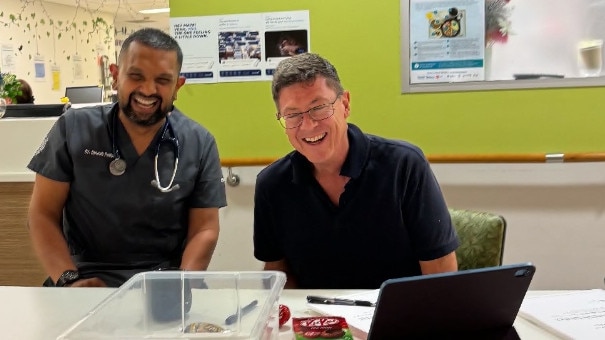
GIVING THE WHEELCHAIR BACK.
Dinesh Palipana, the quadriplegic ED doctor and disability advocate visits his ward bringing Easter eggs. “You will be out of this chair before you know it,” he says.
Squeezing a foam block with his left hand, Mr Molhoek completes a hundred at a time. He’s getting cramps in his fingers. He realises he must rest up for a few days.
By the first week of April comes a significant turning point.
“I made a point yesterday, when I left my room for rehab, I actually pushed the wheelchair in front of me,” he says.
“I wanted to walk in (to rehab) and say “I’m giving you the chair back. I don’t need this anymore”,” he says. His voice breaks, as he recalls pushing the chair towards staffers.
“Aunty” Stanley says the family joined with him. “So we will all cry with him, we are all there for him,” she says.
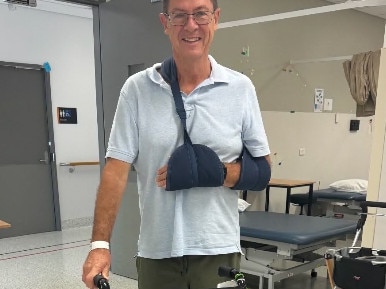
THE ROAD AHEAD AND UNFINISHED BUSINESS
Another three weeks at hospital. A physio outpatient for several months.
“One of the most important parts of my rehab is just walking. I’ve said all along this year I wanted to do a lot more door knocking,” Mr Molhoek says.
He recalls speaking two months ago to Little Grubs at Southport CEO Lily Grubb where they help children with autism. They talked about the latest research into brain therapy.
He reaches out to Griffith University Professor Harry McConnell, who visits his ward. They will create a taskforce to reignite a ten-year plan for a neurological centre of excellence.
“I ended up in hospital in the neurological rehabilitation ward, it couldn’t be any more poignant as a reminder,” Mr Molhoek says.
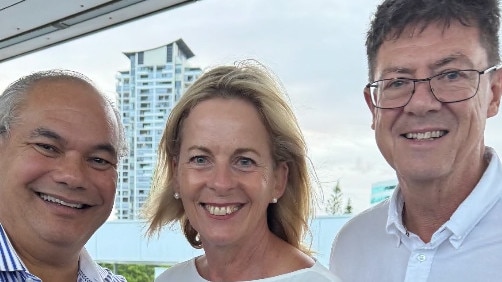
THE KID WHO TAUGHT HIMSELF TO RUN
Young Rob Molhoek wore calipers. He was nicknamed “Tangles” because he tripped over his legs, brought on only late in the second half when his rugby league team was winning.
“I’d feel like coming off an absolute champion even though I wasn’t,” he says.
That determination and drive provided a solid training preparation for this, his toughest return to getting back up on his feet, except this time around — he’s an absolute winner.



